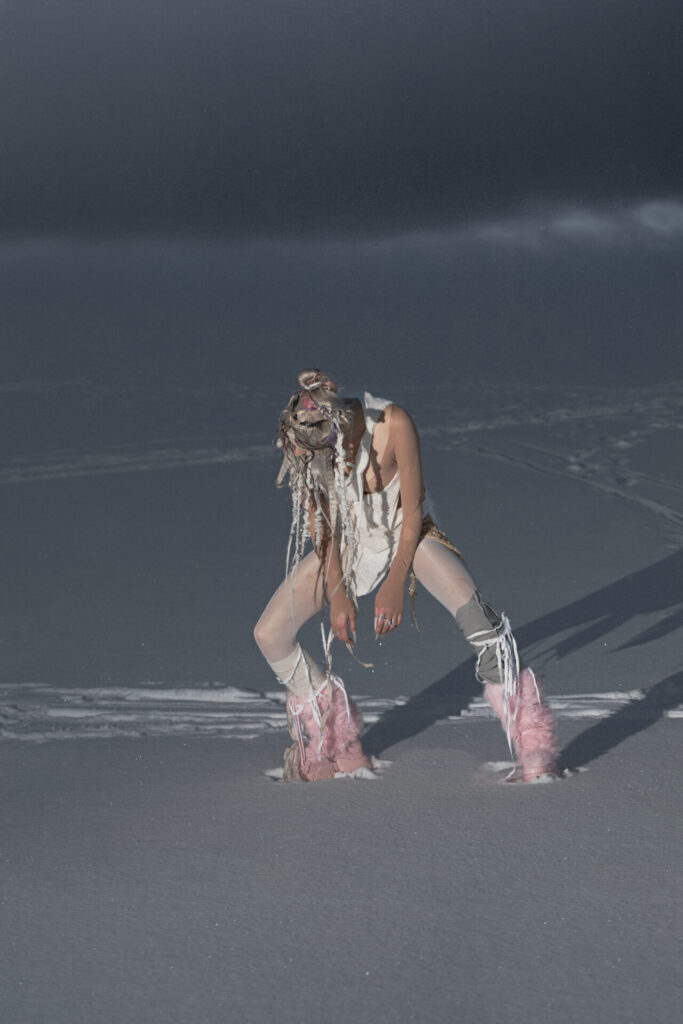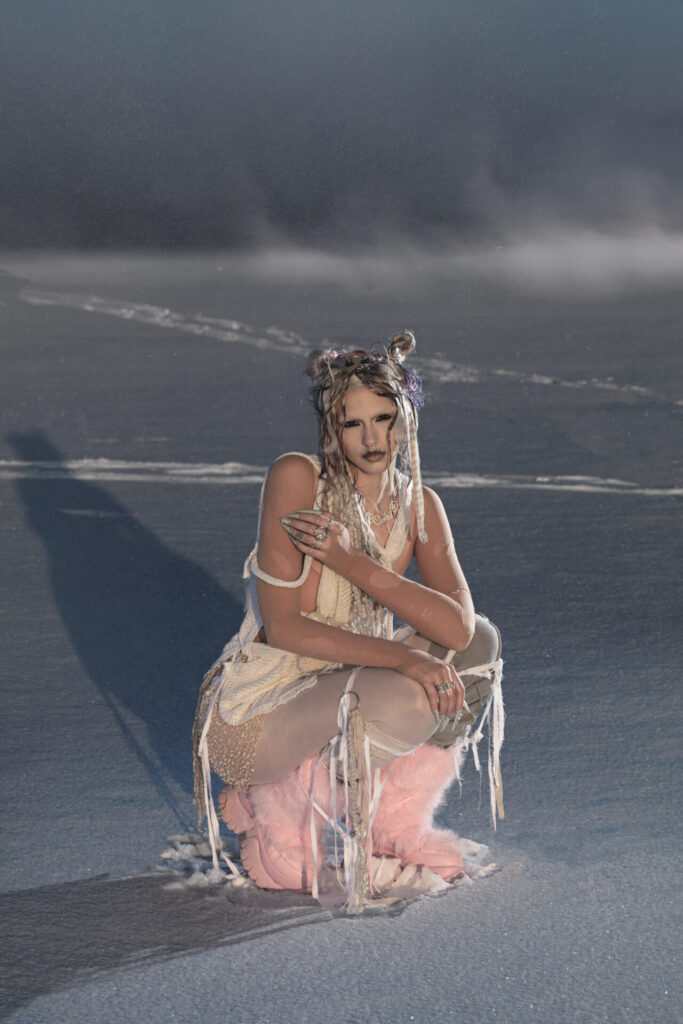Ursula Sereghy’s music is radiantly askew. ‘Fight Child’, the opening track on her latest album Cordial, has labyrinthine chimes ripple around liquid beats. Synthetic wind instruments sprout and spiral. Voice, sliced into snippets, alternates between acting as a drum and a pointillistic choir. It sets the tone for an album where foreground and background, centre and periphery settle in unusual configurations. The Prague-based artist’s work shares space with the gleeful, hyperactive experimentation found on the Orange Milk label. It feels tethered to the aesthetics of Czech-headquartered imprints Gin&Platonic and the now closed Genot Centre. But a unique compositional nuance and use of space also give Sereghy’s tracks a peculiar elegance. Her music is both unfamiliar and welcoming all at once.
“The songs on Cordial should make me feel safe,” Sereghy explains over video call. “When I listen to them I want to get the feeling of security, of home.”
Cordial is Sereghy’s second album after 2021’s OK Box, which was released on Gin&Platonic. She traces its origins to a specific experience after a difficult period in her personal life. “There was a moment where I’d taken psychedelics and I felt the feeling of safety – I understood I’d never felt it before,” she continues. “It was hard to realise that it hadn’t been part of my palette of emotions. Until then I’d felt in danger all the time, it had become such a big part of my character I wasn’t even feeling it anymore.”
The album attempts to grasp, explore and expand the sensation of home and its feelings of sanctuary. The music’s ever-changing forms and textures suggest a complex entanglement between interior and exterior worlds that goes well beyond simple notions of place and property. While Cordial stemmed from a reckoning with personal experiences, through the rearview mirror Sereghy sees wider poignance in its themes. Between releasing her debut and beginning work on Cordial, Russia invaded Ukraine. “In Prague, it felt we were close to having to go and hide in a bunker. Every night for the first six months we were scared there would be another Chernobyl.”
“The album’s not trying to capture ‘something in the air’,” she stresses. “But home is an important topic, even if it sounds basic. There are housing crises everywhere. There’s nowhere to live, rent is half your salary. Everyone is moving all the time.” She notes that in Prague, as a proportion of income rent is among the highest in Europe. “The feeling of insecurity is everywhere.
“It’s important to talk about home as a basic thing people need. It’s not something you have to earn after 50 years of hard work. People are getting used to this idea that home is a luxury rather than a necessity too easily.”
It points to a nuance that’s crucial for understanding Sereghy’s music. Her tracks are colourful, full of luminous textures and bouncy grooves. The intricate imbrications of electronic and acoustic sounds often conjure mental images of sprite-like electronic characters. But she doesn’t see her music as escapist, it’s not “about entering the magic land of fairytales.”
There’s complexity beneath the playful, oddly shaped facades. The fantastic spaces her music conjures are a way of processing, questioning and reimagining the world we live in rather than evading it. She suggests a parallel in Donna Haraway’s book Staying With The Trouble, where she reasons that storytelling and speculative fiction make space for new realities, futures and possibilities to emerge. “The last part of the book really explains why it is important to actually imagine these futures,” Sereghy elaborates. “That’s why I’m quite annoyed when my music is put into an escapist box. This idea of staying with the trouble, mess and chaos… Still having a passion for life without ignoring these aspects is very crucial for me.”
The sheer joy that pervades much of Cordial dwells in a glimpse of how home should feel, at a time where sanctuary and shelter often seem precarious. “I often think about what Ursula K. Le Guin said about the genre of fantasy in literature [in her 2004 speech Some Assumptions About Fantasy]. She was angry about people who were dismissive of fantasy and thought only realist literature was ‘real’. I think there’s something similar in music. Some people think if music is playful it’s not serious music, it’s somehow childish.” Like Le Guin and Haraway, Sereghy doesn’t think that fantasy is inherently naïve or detached from reality. “There’s a quote by Le Guin that I think explains it well: ‘People who deny the existence of dragons are often eaten by dragons. From within.’”
Tellingly, Cordial takes its title from the Latin meaning of the word – ‘from the heart’, rather than the English connotations of warmth and friendliness. A thread in Sereghy’s thinking in recent years has been a strive to escape the confines of rationalist, extractivist and anthropocentric views of the world. An interest in feminist and post-humanist literature grew side-by-side with her move into electronic music. As she later clarifies over email: “The whole idea of a man being an objective observer of facts and the main reason to do that is to exploit it and use it for economical progress… it makes me angry just writing about it.”
Her first instrument was the saxophone, which she got at 14 after hearing Miles Davis sparked a fascination with jazz. At 17 she was busking on the streets to make extra money, and got involved in various rock and jazz groups. She generally steered clear of Prague’s then burgeoning techno scene. “I was a teenager and I just didn’t want to do what everyone else did,” she admits.
A turning point came when she connected with the city’s Synth Library – a space which does what its name suggests as well as hosting lectures and other events. Its website carries the line: ‘Deep listening, no silencing, all shapes and colours triggering change.’ The library’s co-founder, Marie Čtveráčková (also known as Mary C), supported and encouraged Sereghy as she began to explore the possibilities of electronics. “It lets you borrow synths. Synths are very expensive, people who have money can buy a Buchla and an Arturia and decide which one they like, and then make music. Synth Library is opposed to this – it wants to make it affordable for everyone to use whatever they want. They can record there, they can make a whole album there if they want to,” Sereghy says. “The place is very political. It’s built around feminist ideas. It’s trying to diversify the people who make electronic music. The lessons are intended to be accessible for everyone.”
Through the library, Sereghy started to develop her own practice with electronics, and it coincided with a growing interest in writers like Karen Barad and Jane Bennett, as well as Haraway and Le Guin. “I studied chemistry at university,” Sereghy recalls. “Every day, six hours of mathematics and science for four years. My brain was wired in this mathematical way. I needed to rewire into an artistic brain. I started to love books about post-humanistic approaches to the world – the idea that anthropocentrism is fucked and really, we’re all intertwined with everything.” Barad’s Meeting The Universe Halfway, a book which interprets ideas of quantum physics through feminist and post-structuralist lenses, was especially important. “Because she’s a physicist, it spoke to me as I was trying to unlearn being a mathematically minded person,” Sereghy suggests.

The title of Sereghy’s debut, OK Box, is actually a pun on zero degrees Kelvin, a reference to the sense of stasis that descended during the Coronavirus pandemic, when the album was made. Unlike so much ‘Covid’ music, however, OK Box is vibrant and restless. Recorded in relative solitude in a cottage in the woods, although it emerged during a dark time, it also captured a moment of revelation for Sereghy. “I’d been trapped in that mathematical worldview, and I escaped it. It felt freeing.”
Context adds weight to the complex forms in Sereghy’s music. The sense of playfulness, of vivid world-building, has a speculative rather than utopian intent. Unusual patterns and unexpected mutations suggest a plurality of ways of processing how the world is, how we fit into it, and how it could be. From OK Box to Cordial’s engagement with the idea of home, what’s familiar gets reordered, reangled and reconsidered. “I don’t want to claim I’m describing the harmony or chaos of the world with my music,” Sereghy states. “But I can talk about what I think about the world and what surrounds me, and I’m sure it’s mirrored in the music I do.”
Currently, Sereghy is working on Growing In The Dark, a live AV piece which will be premiered at the Lunchmeat Festival in Prague later this month. Its inspirations have parallels with Cordial. “Growing In The Dark is about searching for a home, the feeling of unrootedness. It’s about being unsure who you are and then finding out.”
The live performance will see projections from video artists nismo and realitycongress, while Sereghy will play saxophone and sing live alongside electronics. “The visuals work with themes of background and foreground, landscapes that sometimes seem close and sometimes far away.” These notions of perspective, she notes, are important in feminist and post-humanist literature, a starting point to reevaluating the way the world is apprehended and treated.
“The metaphor for Growing In The Dark would be a plant. A seed doesn’t know where to grow, it just happens, it goes towards warmth and sun – it doesn’t see them, it just follows signals. It grows up, it doesn’t know what’s happening or why it’s doing it. It just has a life push. When you go through hard times, the life push is what pushes you through to the other side.”
Like all of Sereghy’s work, it’s an idea that’s at once playful and profound.
Cordial is out now via Gin&Platonic. Ursula Sereghy will perform Growing In The Dark with nismo and realitycongress at the 2025 edition of Lunchmeat Festival in Prague, which takes place from 22 to 28 September. For tickets and further information, click here


